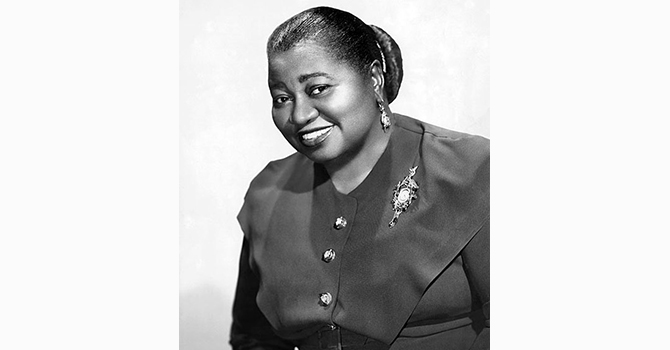She Rose: Hattie McDaniel – the first African American to win an Oscar
By SELENA SEABROOKS The Dallas Examiner Born on June 10, 1895, in Wichita, Kansas, Hattie McDaniel was an American actress, singer-songwriter and comedian, who was the first African American to win an [...] The post She Rose: Hattie McDaniel – the first African American to win an Oscar appeared first on Dallas Examiner.


By SELENA SEABROOKS
The Dallas Examiner
Born on June 10, 1895, in Wichita, Kansas, Hattie McDaniel was an American actress, singer-songwriter and comedian, who was the first African American to win an Academy Award. She won the prestigious award for her role as Mammy in the film Gone with the Wind (1939).
“My own people were especially happy. They felt that in honoring me, Hollywood had honored the entire race. That was the way I wanted it. This was too big a moment for my personal back-slapping. I wanted this occasion to prove an inspiration to Negro youth for many years to come,” McDaniel wrote on winning the Oscar.
Despite her accomplishments, McDaniel faced racism and racial segregation throughout her career. When Gone with the Wind premiered in Atlanta, McDaniel was unable to attend the event due to it being held at a Whites-only theater. And at the Oscars dinner, which was held at a segregated venue, McDaniel was not permitted to sit with her cast members and was placed at a small table at the side of the room.
McDaniel was the youngest of 13 children, born to emancipated slave parents, Susan Holbert and Henry McDaniel. Her mother was a gospel singer and her father fought in the Civil War with the 122nd United States Colored Troops. In 1900, the family moved to Colorado, and McDaniel was raised in Denver where she started to demonstrate her musical and acting talents. In 1910, McDaniel left school and became a performer in several traveling minstrel groups. She later became the first Black woman to be broadcast on American radio on station KOA in Denver, singing with the Melody Hounds.
Between 1926 and 1929, McDaniel recorded several songs for Okeh Records and Paramount Records, but when the Great Depression hit, she had a difficult time finding work. To support herself, McDaniel found work as a bathroom attendant at Sam Pick’s club in Milwaukee. Despite the club’s rule to only hire White performers, the owner reluctantly allowed McDaniel to perform after some patrons encouraged the owner to make an exception. She became a regular performer at the club and performed there for over a year. Soon after, McDaniel moved to Los Angeles where she again experienced difficulties finding work. Since she was unable to find work, McDaniel worked as a maid or cook to survive. She later gained a small role on a local radio show, The Optimistic Do-Nuts, where she performed as a maid named “Hi-Hat Hattie.” Despite her success on the show, her salary remained so low that McDaniel had to continue working as a maid.
In 1932, McDaniel made her first film appearance in The Golden West, and in 1934, she landed her first major role in Judge Priest. In the early 1930s, McDaniel play several film roles for which she was never credited but as she continued to gain popularity and land larger film roles, she began to receive screen credits. She went on to be cast in several movies including The Little Colonel (1935), Vivacious Lady (1938), and The Mad Miss Manton (1938), most of which she played the role of a maid. In total, McDaniel appeared in over 300 films, but only received screen credit for 83. McDaniel’s most notable role came as Mammy, a maid, in the 1939 film, Gone with the Wind, a role that later earned her an Oscar, making McDaniel the first African American to win an Academy Award.
“I sincerely hope that I shall always be a credit to my race and the motion picture industry. My heart is too full to tell you just how I feel,” McDaniel said when accepting the Academy Award on February 29, 1940.
Despite her achievements, McDaniel was often criticized by members of the Black community for the roles she accepted and portrayed in the film. Over her career, she played a maid at least 74 times.
Following World War II, the NAACP and other groups began to lobby Hollywood for an end to the stereotypical roles that McDaniel regularly played. This led to a decline in the amount of film work she received. However, in 1947, she was landed a role as a maid on a reoccurring radio show, The Beulah Show. This made her the first African American to star in a weekly radio program aimed at a general audience.
In 1951, McDaniel suffered a heart attack. Although she recovered sufficiently, she later passed away on October 26, 1952, from breast cancer. One of McDaniel’s final wishes was to be buried in the Hollywood Forever Cemetery; however, this was denied due to the graveyard being restricted to Whites only, at the time.
McDaniel left behind a remarkable legacy of resilience. An incredibly talented actress who prevailed, despite facing racism throughout her career and criticism from her own community. In addition to being the first African American Oscar winner, McDaniel has two stars on the Hollywood Walk of Fame and was inducted into the Black Filmmakers Hall of Fame posthumously. And in 2006, she was featured on the U.S. Postal 39-cent stamp.
“To you young people who are aspiring to succeed in some line of endeavor, in spite of the troubles that many of us have experienced, let me say this, ‘There is still room at the top,’” as quoted by McDaniel on the Wings Over Jordan show, 1940.
Sources:
Smithsonianmag.com, Britannica.com, Biography.com and Oscars.org
The post She Rose: Hattie McDaniel – the first African American to win an Oscar appeared first on Dallas Examiner.







